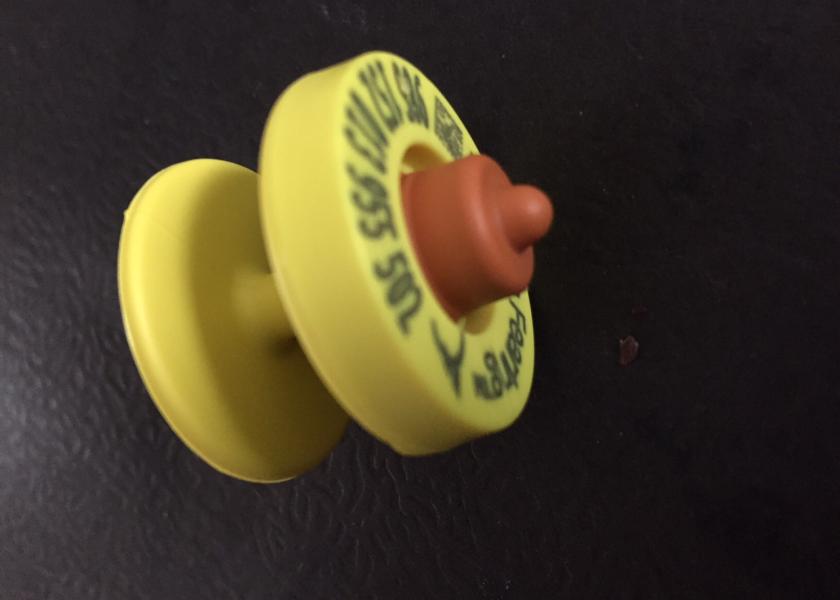R-CALF Suit Seeks To Stop Mandatory RFID

R-CALF USA has filed suit to prevent USDA’s Animal & Plant Health Inspection Service (APHIS) from implementing a plan to mandate the use of RFID tags.
The lawsuit, filed Friday, Oct. 4, 2019, in federal district court in Casper, Wyo., seeks to halt the government’s efforts to eliminate all animal ID options other than radio frequency identification devices and premises registration for adult cattle and bison moving interstate.
The lawsuit was filed by the New Civil Liberties Alliance (NCLA) on behalf of R-CALF and four ranchers from Wyoming and South Dakota. The suit seeks declaratory judgement and an injunction against Ag Secretary Sonny Perdue and APHIS administrator Kevin Shane, who together issued the RFID mandate in April.
The animal disease traceability (ADT) plan set January 1, 2023, as the date all animals that move interstate and fall into specific categories will need official, individual RFID tags. The plan specifically omits feeder cattle. Under present guidelines, feeder cattle and other cattle and bison that move directly to slaughter do not require individual identification.
By Dec. 31, 2019, USDA will stop providing free metal tags, though approved vendors will still be permitted to produce official metal tags for one year. On Jan. 1, 2021, USDA will no longer aprove vendor production of metal ear tags with the USDA shield. Producers and veterinarians must stop applying metal tags and start using only Official RFID tags.
The R-CALF – NCLA lawsuit alleges the requirement that producers use RFID, along with the requirement they obtain a premises identification number (PIN), violate current traceability regulations.
In a news release, the groups said, “The existing regulations, adopted in 2013, allow livestock producers to use the types of effective animal identification techniques and devices that have been widely used by the industry for over 100 years, including brands, tattoos, permanent metal ear tags, group/lot identification, and backtags on animals destined for harvest.”
The lawsuit also alleges the plan to require RFID tags violates the Federal Advisory Committee Act (FACA) and provides a “windfall” for ear tag manufacturers.
Harriet Hageman, NCLA senior litigation counsel, “This case is important well beyond the livestock industry. Under our Constitution, Congress is the legislative branch responsible for making the law. The executive branch, which encompasses USDA and APHIS, is tasked with carrying it out. Congress has not passed legislation requiring animal RFID, these agencies have. Of even greater concern is the fact that they did so through the back door and without following the law. Forcing livestock producers to adhere to an RFID program will have an enormous impact on their operations, with noncompliance resulting in the denial of access to interstate markets. The USDA and APHIS are seeking to force compliance through extralegal lawmaking. That practice violates our clients’ Constitutional rights. This situation is exactly why NCLA was formed—to stop federal agencies from violating the law by circumventing rulemaking.”
R-CALF USA CEO Bill Bullard said the U.S. already has numerous and effective traceability systems.
“The USDA is catering to special interests and running roughshod over the rights of America’s cattle producers by forcing them and their industry to incur costs that could run into the billions of dollars," Bullard said in the news release. "The agency wants to gift RFID ear tag manufactures even more profits and is continually subjecting our industry to greater risks of foreign disease introduction through unrestrained imports of cattle from Mexico, a known reservoir of bovine tuberculosis; and from Canada, a known reservoir of brucellosis.
“Our lawsuit draws a line in the sand telling the USDA that our industry will no longer stand for the agency’s blatant government overreach.” Bullard said.
The individual plaintiffs in this case are Tracy and Donna Hunt, cattle ranchers from Newcastle, Wyoming, and Kenny and Roxene Fox, cattle ranchers from Belvidere, South Dakota.







